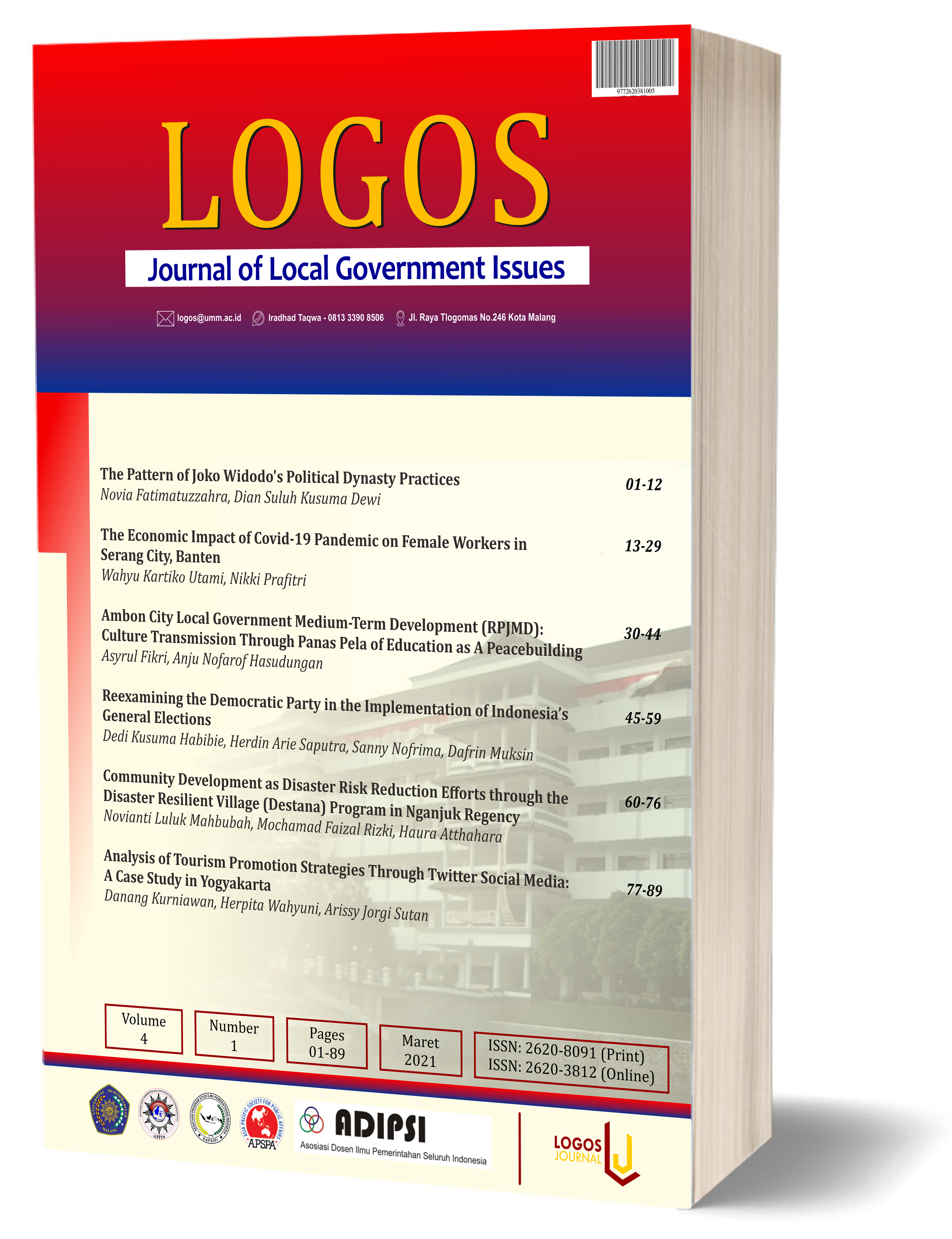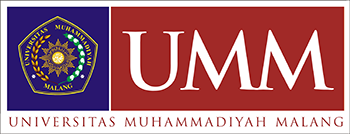Ambon City Local Government Medium-Term Development (RPJMD): Culture Transmission Through Panas Pela of Education as A Peacebuilding
DOI:
https://doi.org/10.22219/logos.v4i1.12751Keywords:
Peace Education, Peace Building, Loca Wisdom, Conflict Resolution, Ambon ConflictAbstract
Pela Gandong local wisdom has played a significant role as a media for Ambon conflict resolution. The existence of dialogue and communication based on Pela Gandong culture can bring mutually battling parties to achieve peace. Therefore, the purpose of the study is to describe how SMPN 4 Salahutu Liang Central Maluku with 100% Muslim students also, SMPN 9 Ambon City with 99% of their Christian/Catholic students in implementing Panas Pela of Education as the transmission of Pela Gandong culture as an implementation of the Ambon City Regional Medium-term Development Plan (RPJMD). Panas Pela of education is an assemblage of students with different religions tore-warm the sibling relationship (Pela Gandong). This study uses descriptive qualitative research methods with a case study approach. Data collection is done by participatory observation, literature study, document analysis, and interviews. The results showed that the Panas Pela of Education activity on January 29, 2018, had succeeded in transmitting Pela Gandong culture to students to maintain peace. It can be seen by student’s ability from both schools to blend in with one another without segregation and together celebrate the Panas Pela of Education. It is expected that the field of education implementing Panas Pela of Education sustainably. It will surely be successful because the local wisdom of the Pela Gandong has been integrated into the Ambon City Local Government Medium-term Development Plan (RPJMD).
Downloads
References
Ahmad, A. (2009). Mengembangkan Budaya Damai di Sekolah Melalui Manajemen Kelas Yang Demokratis Berbasis Nilai-Nilai Keislaman. HUNAFA: Jurnal Studia Islamika, 6(2), 139-152. https://doi.org/10.24239/jsi.v6i2.127.139-152
Ambon, P. K. (2013). RPJMD 2011-2016, https://ambon.go.id/rpjmd-2011-2016/. Ambon.
Amirrachman, R. (2012). Peace Education in the Moluccas, Indonesia: Between Global Models And Local Interests. UvA-DARE (Digital Academic Repository)(nd). Dissertation: University of Amsterdam
Ansori, M. H., Putra, R. P. A., Efendi, J., Peranto, S., Sukandar, R., Cholid, S., . . . Hutagalung, V. (2015). Post-Conflict Democracy, Violence, and Peace-Building in Aceh and Maluku. Jakarta: The Habibie Center.
Astri, H. (2011). Penyelesaian konflik sosial melalui penguatan kearifan lokal. Aspirasi: Jurnal Masalah-masalah Sosial, 2(2), 151–162. https://doi.org/10.46807/aspirasi.v2i2.439
Astuti, S. D. (2016). Transmisi Budaya dan Kearifan Lokal pada Pendidikan Islam Anak Usia Dini. Jurnal penelitian, 13 (1) 1-14. https://doi.org/10.28918/jupe.v13i1.1190
Christiyanto, F. (2019). Implementasi Program Rencana Pembangunan Jangka Menengah Daerah (RPJMD) Kabupaten Kutai Barat Tahun 2011-2015. Jurnal Administrative Reform (JAR), 6(2), 93-101. http://dx.doi.org/10.52239/jar.v6i2.1903
Clapham, C. (1998). Rwanda: the Perils of Peacemaking. Journal of Peace Research, 35(2), 193-210. Retrieved March 23, 2021, from http://www.jstor.org/stable/425520
Crocker, C. A., Hampson, F. O., & Aall, P. (1997). Managing Global Chaos: Sources of the Responses to International Conflict. Long Range Planning, 30 (4).
Febrian, R. A., & Handrisal, H. (2018). Akuntabilitas Pencapaian Visi, Misi, Dan Program Kepala Daerah Dan Wakil Kepala Daerah Terpilih (Studi Bidang Kehutanan Pada RPJMD 2014-2019 Provinsi Riau). KEMUDI: Jurnal Ilmu Pemerintahan, 3(1), 1-35. Retrieved from https://ojs.umrah.ac.id/index.php/kemudi/article/view/764
Hadi, S. (2007). Disintegrasi Pasca Orde Baru: Negara, Konflik Lokal, dan Dinamika Internasional. Sleman: Yayasan Obor Indonesia.
Harmusial, L. D. (2019). Interview witfh head of SMPN 9 Kota Ambon.
Jabri, V. (1996). Discourses on Violence: Conflict Analysis Reconsidered. Manchester: Manchester University Press.
Jafar, M. (2018). Conflict Resolution of Regional Head Election (PILKADA) Buru Selatan District in 2015. Journal of Local Government Issues (LOGOS), 1(2), 152-177. https://doi.org/10.22219/logos.Vol1.No2.152-177
Jati, W. R. (2013). Kearifan Lokal Sebagai Resolusi Konflik Keagamaan. Walisongo: Jurnal Penelitian Sosial Keagamaan, 21(2), 393-416. https://doi.org/10.21580/ws.21.2.251
Kamim, A. B. M., Amal, I., & Khandiq, M. R. Aspek Politik Perencanaan Pembangunan RPJMD Daerah Istimewa Yogyakarta 2017-2022. Jurnal Wacana Kinerja 21 (2), 55-75.
Lestari, L., Rini, D. M., & Dwiyanti, N. (2018). Evaluasi Pelaksanaan Rencana Pembangunan Jangka Menengah Daerah (RPJMD) Bidang Urusan Pekerjaan Umum Kabupaten Kepulauan Anambas, Provinsi Kepulauan Riau. Jurnal Trias Politika, 2(2), 203-215. https://doi.org/10.33373/jtp.v2i2.1469
Malatuny, Y. G., & Ritiauw, S. P. (2018). Eksistensi Pela Gandong Sebagai Civic Culture Dalam Menjaga Harmonisasi Masyarakat di Maluku. Sosio Didaktika: Social Science Education Journal, 5 (2), 35-46. https://doi.org/10.15408/sd.v5i2.10554
Manuputty, J., Salampessy, Z., Ali-Fauzi, I., & Rafsadi, I. (2014). Carita orang basudara: Kisah-kisah perdamaian dari Maluku. Maluku: Lembaga Antar Iman Maluku.
Miall, H., Ramsbotham, O., & Woodhouse, T. (2002). Resolusi Damai Konflik Kontemporer. Jakarta: PT Raja Grafindo.
Miles, M. B., & Huberman, A. M. (1992). Analisa Data Kualitatif (edisi 1). Jakarta: Penerbit Universitas Indonesia.
Onyenankeya, O., Onyenankeya, K., & Osunkunle, O. (2017). The Persuasive Influence of Nollywood Film in Cultural Transmission: Negotiating Nigerian Culture in A South African Environment. Journal of Intercultural CommunIcatIon Research, 46(4), 297-313.
Rahardjo, M. (2017). Studi Kasus Dalam Penelitian Kualitatif: Konsep dan Prosedurnya. Research Repository Universitas Islam Maulana Ibrahim Malang. http://repository.uin-malang.ac.id/1104/1/Studi-kasus-dalam-penelitian-kualitatif.pdf
Rathje, S. (2009). The Definition of Culture: An Application-Oriented Overhaul. Interculture Journal, 35. https://ssrn.com/abstract=1533439
Suastra, I. W. (2005). Merekonstruksi Sains Asli (Indigenous Science) Dalam Rangka Mengembangkan Pendidikan Sains Berbasis Budaya Lokal di Sekolah: Studi Etnosains Pada Masyarakat Penglipuran Bali. Tesis: Universitas Pendidikan Indonesia.
Tapotubun, H. (2019). "Panas pela: Unchanged Ritual and Renewal the Meaning". International Journal Of Peace adn Development Studies.
Tuwanakotta, F. (2017). Media Sosial Sebagai Ruang Publik Komunitas Muda-Mudi Dalam Mengantisipasi Ancaman Konflik Ambon Akibat Segregasi. Tesis: Universitas Gadjah Mada.
Wahyuddin, M. (2017). Evaluasi Pelaksanaan Rencana Pembangunan Jangka Menengah Daerah (RPJMD) Kabupaten Berau Tahun 2010-2015 Bidang Pendidikan Dan Bidang Kesehatan. Jurnal Paradigma (JP), 5(1), 1-10. http://dx.doi.org/10.52239/jp.v5i1.423
Wakano, A. (2019). Nilai-nilai Pendidikan Multikultural dalam Kearifan Lokal Masyarakat Maluku. al-Iltizam: Jurnal Pendidikan Agama Islam, 4(2), 26-43. http://dx.doi.org/10.33477/alt.v4i2.1006
Widiyanti, J. H. (2019). Kesejangan antara Rencana dan Implementasi Rencana Pembangunan Jangka Menengah Daerah (RPJMD) Kabupaten Pasuruan Tahun 2013-2018. Jurnal Ilmiah Administrasi Publik, 5(3), 432-439. https://doi.org/10.21776/ub.jiap.2019.005.03.21
Widiyowati, E., Kriyantono, R., & Prasetyo, B. D. (2018). Model Manajemen Konflik Berbasis Kearifan Lokal: Konflik Perguruan Pencak Silat di Madiun–Jawa Timur. Komunikator, 10(1), 34-47. https://doi.org/10.18196/jkm.101004
Woodhouse, T. (2000). Conflict Resolution and Peacekeeping: Critiques and Responses. International Peacekeeping, 7(1), 8-26. https://www.researchgate.net/deref/http%3A%2F%2Fdx.doi.org%2F10.1080%2F13533310008413816
Yandra, A. (2016). Partisipasi Masyarakat dalam Penyusunan Rencana Pembangunan Jangka Menengah Daerah (RPJMD) Kota Pekanbaru 2012-2017. PUBLIKA: Jurnal Ilmu Administrasi Publik, 2(1), 48-58.
Downloads
Published
How to Cite
Issue
Section
License
Copyright (c) 2021 Asyrul Fikri, Anju Nofarof Hasudungan

This work is licensed under a Creative Commons Attribution-ShareAlike 4.0 International License.
Authors who publish with this journal agree to the following terms:
- Authors retain copyright and grant the journal right of first publication with the work simultaneously licensed under a Creative Commons Attribution-ShareAlike 4.0 International License. that allows others to share the work with an acknowledgment of the work's authorship and initial publication in this journal.
- Authors are able to enter into separate, additional contractual arrangements for the non-exclusive distribution of the journal's published version of the work (e.g., post it to an institutional repository or publish it in a book), with an acknowledgment of its initial publication in this journal.
- Authors are permitted and encouraged to post their work online (e.g., in institutional repositories or on their website) prior to and during the submission process, as it can lead to productive exchanges, as well as earlier and greater citation of published work (See The Effect of Open Access).

This work is licensed under a Creative Commons Attribution-ShareAlike 4.0 International License.













